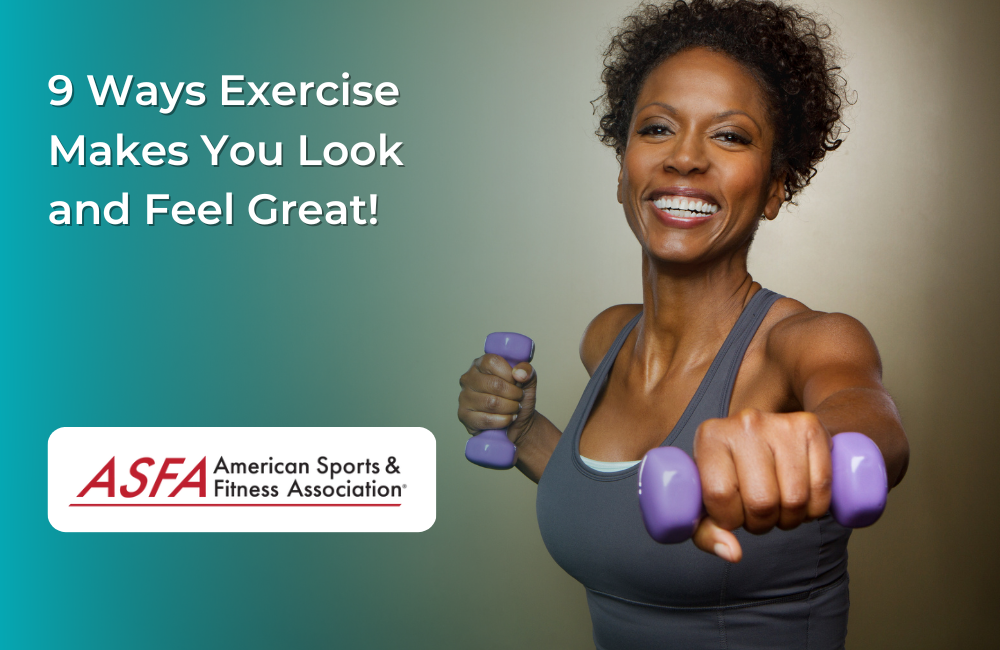Whether you're trying to lose weight or stay healthy, you may have heard that exercise is good for your body. But what are the specific ways that it makes you feel? Here are nine ways exercise can benefit both your mind and body:
Exercise makes you look better.
Exercise helps you look better in the mirror, so you'll feel more confident as you go about your day.
It can also help improve your complexion and make your skin look healthier, making a big difference in how others perceive you (and how good you feel about yourself).
Exercise also helps build muscle tone, making it easier to wear clothes that fit well--and feel great on your body!
Exercise helps you feel more confident.
Exercise can help you feel more confident. When you exercise, your body looks and feels better. You'll notice that when you're at the gym or playing sports, people start to look at you differently because of how healthy and fit they think that makes them appear to be.
This confidence boost will spill over into other areas of life as well--you may even find yourself becoming more assertive or outgoing in social situations as a result of feeling good about yourself!
Exercise can help you sleep better.
Physical activity increases your body temperature, which in turn encourages sleep. When you exercise, your body temperature rises and returns to normal after about 20 minutes. This rise in temperature causes a relaxation response in the brain, making it easier for you to fall asleep faster and sleep longer than usual. In addition, getting at least 30 minutes of physical activity daily can ease insomnia symptoms by increasing hormones that promote restfulness (melatonin) and reducing stress levels (adrenaline).
Exercise relieves stress
If you feel stressed, exercise can help you relax. It's a natural way to relieve tension and boost your mood so that you can enjoy life more fully. Exercise also helps people sleep better because it lowers levels of the stress hormone cortisol, which has been linked with sleep problems in some people. And when we're feeling good about ourselves, we tend to feel more confident--and this confidence makes us appear healthier to others!
Exercise can improve your mood and energy levels.
Exercise can help you feel more confident and energetic, making you look better! If you're feeling down or depressed, it's time to get out there and start moving! Exercise releases endorphins (the body's natural painkillers), making you happier and more positive about yourself.
Exercise can help with weight management and maintenance.
Exercise is one of the most effective ways to lose and maintain that weight loss. According to a study published in The American Journal of Medicine, people who exercise for at least 30 minutes every day are more likely to keep their weight under control than those who don't work out as regularly.
The best way to use exercise as part of your weight management plan is by pairing it with healthy eating habits. This means avoiding processed foods, sugar, and refined carbs--and replacing them with whole grains, lean proteins (like chicken breast), fruits, and vegetables instead! You should also try not to drink any soda or other sugary drinks; instead, try having water throughout the day!
It's great for your heart health.
You know that exercise is great for your heart, but it's also important to know that it can help lower blood pressure and cholesterol levels. And these are two risk factors for heart disease! So even if you're not looking to lose weight and improve your overall health, exercise will still be beneficial in keeping your heart healthy.
- It helps manage weight: If you want to manage your weight or prevent obesity, which can contribute to heart disease, then regular physical activity is key.
Regular exercise can slow down the aging process in your body.
Exercise can help slow down the aging process in your body. It can also help you live longer and maintain a more active, independent life as you age.
Exercise has been shown to:
- Increase your lifespan by up to 10 years!
- Help reduce or prevent chronic diseases such as diabetes, heart disease, and cancer.
- Reduce risk factors associated with these diseases, such as high blood pressure, cholesterol levels, and triglycerides (a type of fat).
- Prevent frailty--a condition characterized by decreased strength, stamina, and physical function that makes it difficult for older adults to do everyday activities like dressing themselves or walking across their home without assistance.
It makes it easier to manage certain conditions (like diabetes) or symptoms (like depression).
Exercise has been shown to help with the following conditions and symptoms:
- Depression. A study published in the journal Depression and Anxiety found that people who exercised for 30 minutes daily had better mental health than those who didn't exercise. The researchers suggested that even light physical activity (like walking or gardening) could be beneficial for people with depression.
- Diabetes. Research has shown that regular aerobic exercise can help lower blood sugar levels in people with type 2 diabetes, even if they don't lose weight--and it may even prevent Type 2 diabetes altogether!
- Anxiety disorders such as panic attacks or generalized anxiety disorder (GAD). A review of studies found that aerobic exercise was an effective treatment for both anxiety disorders when used alone or in combination with medication or therapy sessions.
Takeaway: physical activity benefits your mental, emotional, and physical well-being. You should make time for it!
You should make time for exercise. It's good for your mental, emotional, and physical well-being.
There are many different types of exercise that you can do:
- walking or running
- cycling (on a stationary bike or outside)
- swimming laps in a pool
If you want to start an exercise routine but need help knowing where to begin, talk with a doctor about what activities would best suit your current health status.
Conclusion
We hope this list has helped you realize how much exercise can benefit you. It's not just about looking good or feeling confident; it's also about having better health and a happier life! If you're not already doing so, consider adding more physical activity into your routine--and remember that even small changes (like walking instead of taking a car) can make a big difference over time.





